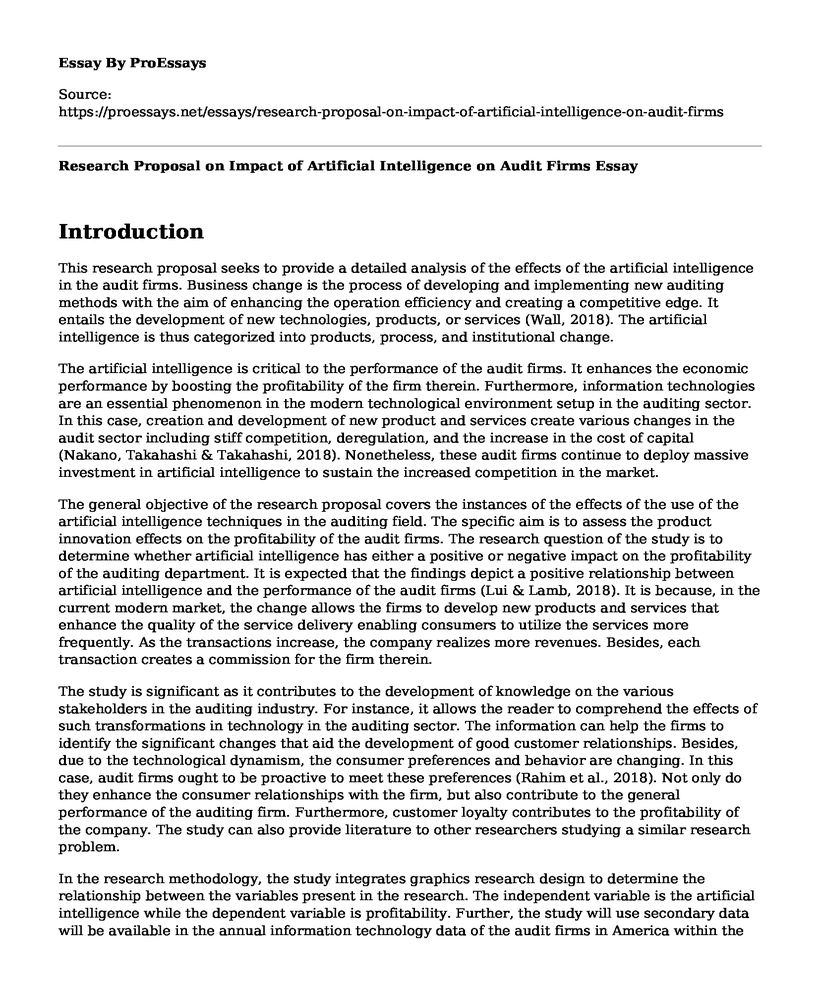Introduction
This research proposal seeks to provide a detailed analysis of the effects of the artificial intelligence in the audit firms. Business change is the process of developing and implementing new auditing methods with the aim of enhancing the operation efficiency and creating a competitive edge. It entails the development of new technologies, products, or services (Wall, 2018). The artificial intelligence is thus categorized into products, process, and institutional change.
The artificial intelligence is critical to the performance of the audit firms. It enhances the economic performance by boosting the profitability of the firm therein. Furthermore, information technologies are an essential phenomenon in the modern technological environment setup in the auditing sector. In this case, creation and development of new product and services create various changes in the audit sector including stiff competition, deregulation, and the increase in the cost of capital (Nakano, Takahashi & Takahashi, 2018). Nonetheless, these audit firms continue to deploy massive investment in artificial intelligence to sustain the increased competition in the market.
The general objective of the research proposal covers the instances of the effects of the use of the artificial intelligence techniques in the auditing field. The specific aim is to assess the product innovation effects on the profitability of the audit firms. The research question of the study is to determine whether artificial intelligence has either a positive or negative impact on the profitability of the auditing department. It is expected that the findings depict a positive relationship between artificial intelligence and the performance of the audit firms (Lui & Lamb, 2018). It is because, in the current modern market, the change allows the firms to develop new products and services that enhance the quality of the service delivery enabling consumers to utilize the services more frequently. As the transactions increase, the company realizes more revenues. Besides, each transaction creates a commission for the firm therein.
The study is significant as it contributes to the development of knowledge on the various stakeholders in the auditing industry. For instance, it allows the reader to comprehend the effects of such transformations in technology in the auditing sector. The information can help the firms to identify the significant changes that aid the development of good customer relationships. Besides, due to the technological dynamism, the consumer preferences and behavior are changing. In this case, audit firms ought to be proactive to meet these preferences (Rahim et al., 2018). Not only do they enhance the consumer relationships with the firm, but also contribute to the general performance of the auditing firm. Furthermore, customer loyalty contributes to the profitability of the company. The study can also provide literature to other researchers studying a similar research problem.
In the research methodology, the study integrates graphics research design to determine the relationship between the variables present in the research. The independent variable is the artificial intelligence while the dependent variable is profitability. Further, the study will use secondary data will be available in the annual information technology data of the audit firms in America within the last ten years acquired from the Compustat (Rezaee, Jozmaleki & Valipour, 2018). The study will use a multiple linear regression model and the Pearson correlation coefficient to find out the link between the profitability of the audit firms and the artificial intelligence parameters employed in the firms. Furthermore, it will incorporate the Analysis of variance (ANOVA) model to tests the significance of findings.
References
Lui, A., & Lamb, G. W. (2018). Artificial intelligence and augmented intelligence collaboration: regaining trust and confidence in the financial sector. Information & Communications Technology Law, 1-17.
Nakano, M., Takahashi, A., & Takahashi, S. (2018). State space approach to adaptive artificial intelligence modeling: Application to financial portfolio with fuzzy system.
Rahim, S. R. M., Mohamad, Z. Z., Bakar, J. A., Mohsin, F. H., & Isa, N. M. (2018). Artificial Intelligence, Smart Contract and Islamic Finance. Asian Social Science, 14(2), 145.Rezaee, M. J., Jozmaleki, M., & Valipour, M. (2018). Integrating dynamic fuzzy C-means, data envelopment analysis and artificial neural network to online prediction performance of companies in stock exchange. Physical A: Statistical Mechanics and its Applications, 489, 78-93.
Wall, L. D. (2018). Some Financial Regulatory Implications of Artificial Intelligence. Journal of Economics and Business.
Cite this page
Research Proposal on Impact of Artificial Intelligence on Audit Firms. (2022, Jun 05). Retrieved from https://proessays.net/essays/research-proposal-on-impact-of-artificial-intelligence-on-audit-firms
If you are the original author of this essay and no longer wish to have it published on the ProEssays website, please click below to request its removal:
- Electric Cars Will Be the Future of America Essay
- Essay Sample on Investing Globally: Location Matters in Business Growth
- Essay Sample on AI-Powered Marketing Decisions: A New Era
- Essay on $800K Funding Secured: QueueDr Software to Reduce Cancellations in Q2 2020
- AI and Society: Ethical Guidelines for Coexistence - Essay Sample
- Cell Phones: A Necessity That Is Changing Society - Essay Sample
- New Safety Deposit Box at Elmore Bank Welcomed by Groom-to-Be Jimmy - Essay Sample







